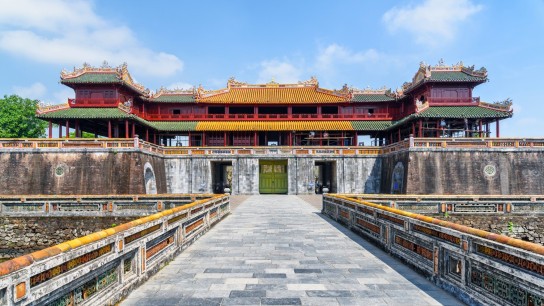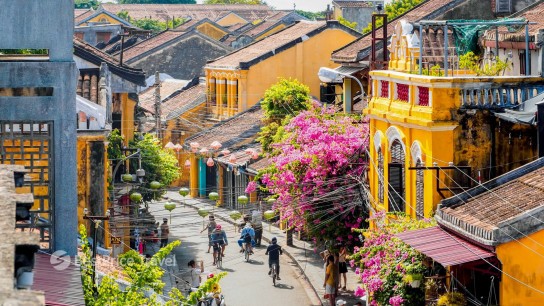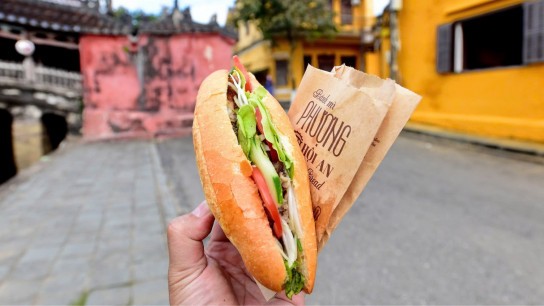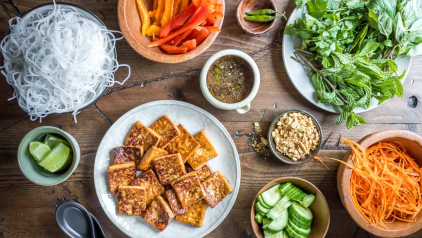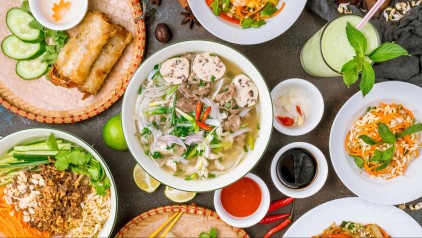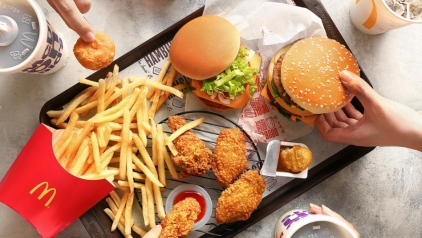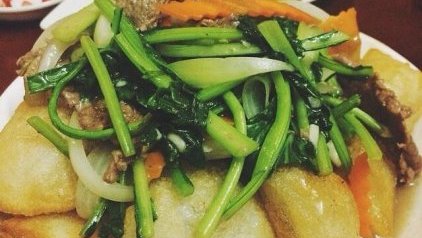All You Need to Know about Vietnamese Noodles
Vietnamese noodles are among the most must-try dishes in Vietnam. If you are not familiar with this kind of food, you should read this article to know all about various types of noodles in Vietnam and top must-eat delicious noodle dishes.
Vietnamese cuisine is extremely diverse but mainly based on rice. From rice and other ingredients, Vietnamese create noodle and a noodle dish become an important part of Vietnam cuisine. You can find a noodle dish in almost every corner in Vietnam from the North to the South. Noodle dishes like Pho Noodle Soup, Bun Cha, or Mi Quang are something you should not miss when you are in Vietnam. This article will introduce brief information about Vietnamese noodles from the history of noodles to the best places to eat noodles in Vietnam.
History of Vietnamese noodles
The birth of noodles in Vietnam
The history of Vietnam began around 12,000 BC. Vietnamese probably sustain life through hunting and harvesting plants. Six thousand years later, there is evidence of their raising of wet rice, herbs, plants, fish, and animals. From that time, rice became one of the nutritional staples for the Vietnamese people. Cooking techniques were more sophisticated and influenced by other countries.
Since the 2nd century, BC Vietnamese people lived under the reign of various Chinese dynasties for 1,000 years, and noodles were exported to Vietnam around the time of the East Han Dynasty. Vietnamese adopted the way to create noodles, made the noodles in different and delicious ways.
Pho noodle soups
The most popular noodle dish is Pho noodle soup. Some people say Pho noodle soup has French roots. It was the French who brought the beef broth to Vietnam to combine it with noodles, making the legendary Pho noodle soup. Others say Pho noodle soup is something similar to Chinese noodle soup called "ngưu nhục phấn" (noodle with buffalo meat). When coming to Vietnam, buffalo meat is replaced by beef meat, and Vietnamese people create Pho like today with broth, noodles, and beef. We will probably never know where it originated, but we know for sure Pho can be found in nearly every street corner in Hanoi from 1910 to 1954. After 1954, when Vietnam was split in two, and many Northerners migrated to the South, bringing their recipes with them. In the South, it is sunny all the time, herbs, lime, and bean sprouts are available any time, being added to Pho. The broth of Pho became spicier and more dominantly sour, making Pho become the international standard.
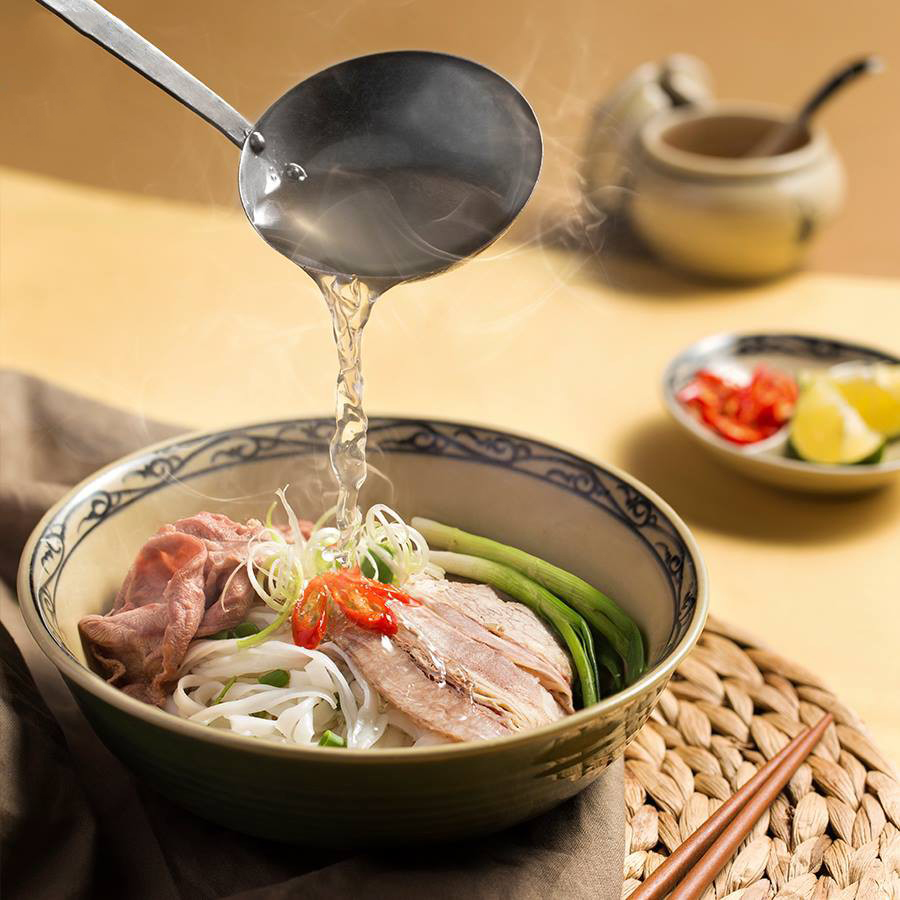
Pho noodle soup
Types of Vietnamese noodles
- Bun (Rice vermicelli): It is the most popular noodle which can be found in many dishes like Bun Rieu, Bun Cha, Bun Thit Nuong, Bun Bo Hue. It is slippery, it can be very thin or thick.
- Pho: It is like "Bun", but flat, not string-shaped. It is used to cook Pho noodle soup; Pho roll or Stirred Pho.
- Banh Canh: It resembles a Japanese udon noodle. It is made from tapioca flour or tapioca flour with rice flour.
- Mi (egg noodles): It is used to cook with seafood or beef to make stir-fried egg noodles.
- Hu Tieu (Clear rice noodle): It is a squarish rice noodle. It can be served with hor without soup.
- Mien (Glass noodles): It is gray, opaque, made from mung bean flour, or tapioca. It is chewy and slippery. Mien goes well with chicken broth.
- Cao Lau: It is used to make Cao Lau dish. It is said to come from Chinese or Japan. Its texture is very special, it is chewy, soft, and dry.
- Banh Da Cua: It is originated from Hai Phong. The noodle can be white or brown-red, or yellowish-brown. It is thinner and more transparent than Pho.
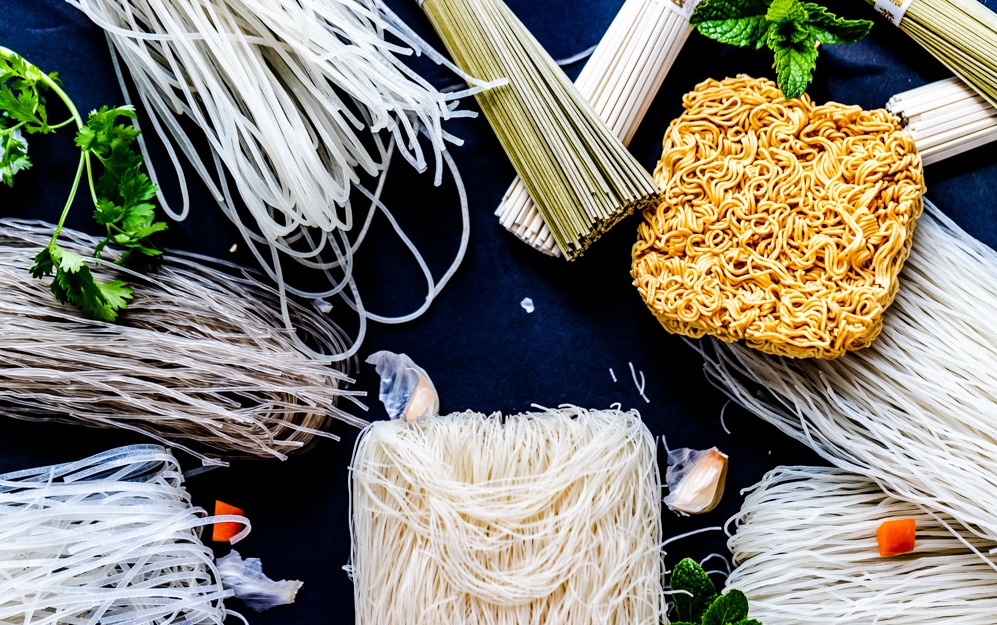
Different types of Vietnamese noodles
Typical dishes of Vietnamese noodles
From different types of noodles, Vietnamese create a variety of noodle dishes: from hot noodle soup to dry noodles or noodle rolls. Each religion adds different ingredients, uses different cooking techniques, and creates unique dishes. Hanoi is famous for Pho noodle soups, banh cuon, pho cuon, bun rieu cua, bun dau mam tom while Saigon has its dishes like goi cuon, bun bo nam bo. The Center part of Vietnam owns the best Mi Quang, Cao Lau, Bun bo Hue. Some dishes like Hu Tieu Nam Vang, Bun man are strongly influenced by foreign countries, but they have their own specialty.
Hot noodle soups
Pho noodle soup
Pho noodle soup, a traditional food of Vietnam is undoubtedly the most well-known Vietnamese dish overseas. A broth made by simmering beef bones and herbs, fresh rice noodles, and meat (beef, chicken) are the three main components of this noodle soup. To the Vietnamese people, the stunning part about pho is the broth. The broth is cooked differently in the north and south of Vietnam. The most noticeable difference is that the southern pho has a sweeter, richer broth whereas in the north it is clear and simple. A stall with an excellent broth is always crowded with locals.

Pho noodle soup
Bun Bo Hue (Hue beef noodle soup)
Hue beef noodle soup is another version of noodle soup with beef, originated from Hue City, the longtime imperial capital of Vietnam. The difference between these two dishes is that with “Bun Bo Hue,” the noodle is thicker, larger, and more slippery, the broth is spicier. To prepare a delicious Bun Bo Hue, the cook will put thick round rice noodles into a bowl and top with slices of brisket, pieces of ham hocks, and cubes of congealed pig’s blood. The savory broth is then poured on top of the rice noodles. To finish off, add a garnish of green onions, cilantro, and white onions. Similar to other noodle dishes, Bun Bo Hue is always served with a plate of shredded cabbage, banana blossoms, bean sprouts, mint leaves, and lime wedges.
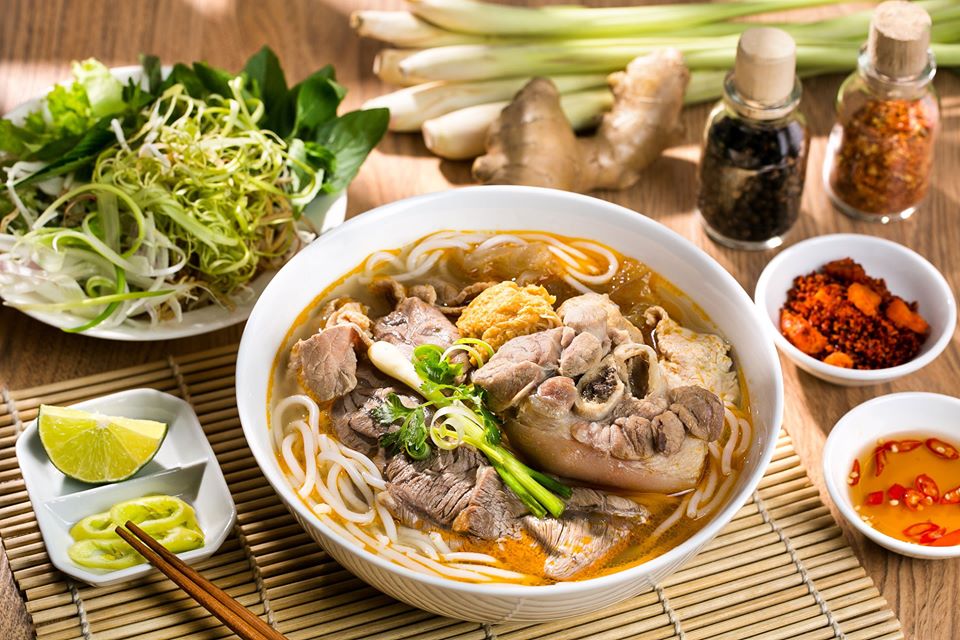
Bun Bo Hue (Hue beef noodle soup)
Cao Lau Hoi An (Traditional noodle dish of Hoi An)
Cao Lau is the most famous noodle dish from Hoi An, the iconic noodle dish of the land. You can not find Cao Lau elsewhere, but only in Hoi An Old Town. The broth of this noodle dish is taken from the local Ba Le Well and the fresh vegetables are from Tra Que Village. The noodles will be mixed with roasted pork and some herbs, resulting in the unique flavor.

Cao Lau Hoi An
Mi Quang
Mi Quang is another popular noodle dish from central Vietnam, originating from the Quang Nam province. The dish features thick, wide, yellow rice noodles served in red-orange turmeric sauce with a choice of pork, chicken, shrimp, quail egg, mussel, and eel served in a soupy, beefy broth. Unlike other soups like Pho or Hu Tieu, this noodle is served with very little broth. Each dish is filled with thin rice noodles, chicken, or a combination of shrimp and pork belly. Then topped up with black sesame rice crackers, crunchy banana blossoms, toasted peanuts, cilantro, green chilies, and finished off with lime juice. Mi Quang has many variations because street food stalls or restaurants have many different ways to cook.
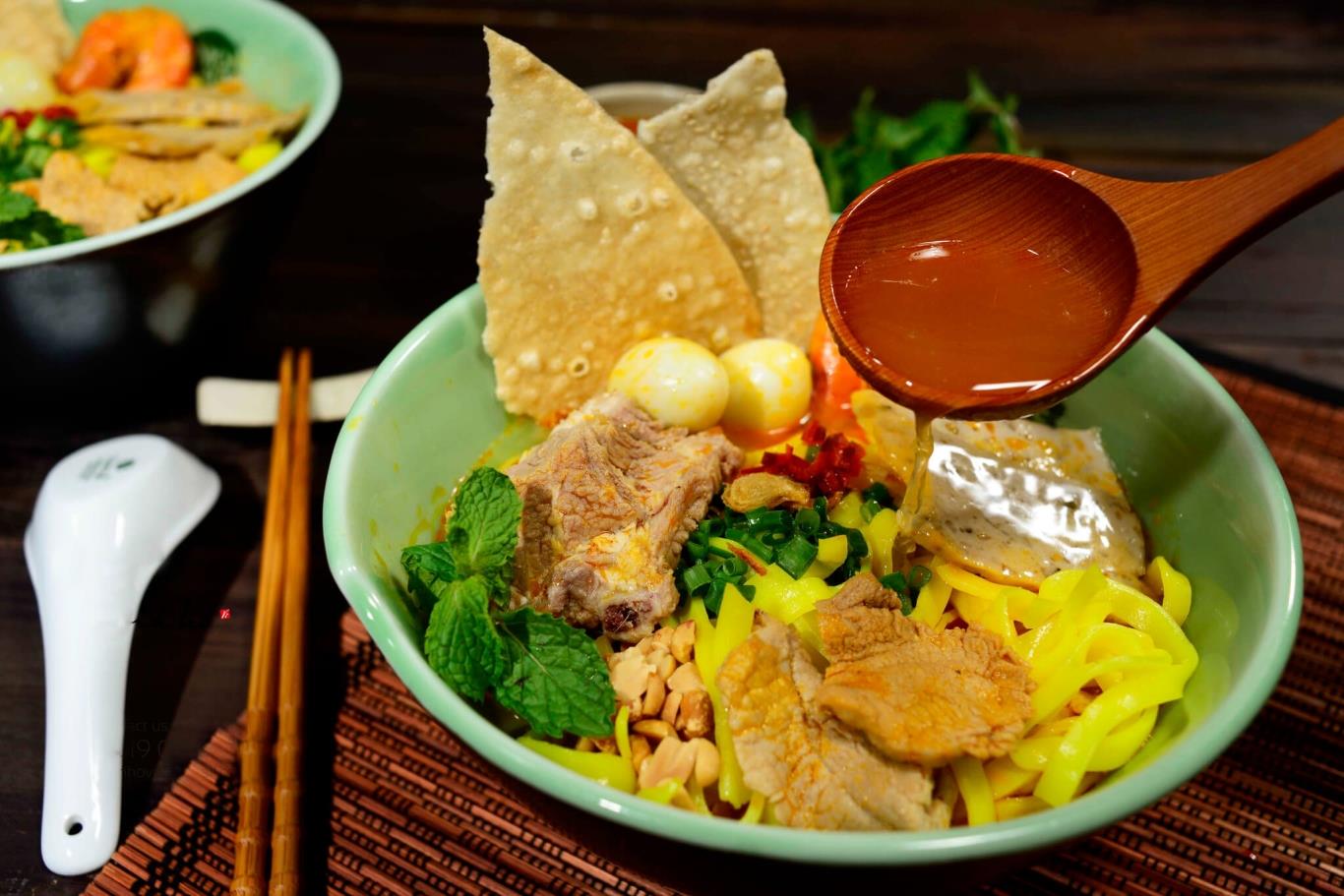
Mi Quang
Hu tieu Nam Vang
Hu Tieu Nam Vang is a popular noodle soup in Saigon. The dish was originated from Cambodia and changed to suit their taste. A bowl of noodles often includes rice noodles, slices of all sorts of pig organs, a quail egg, and a shrimp. The toppings may include pork, pork ribs, pork offal, shrimp, squid, wonton dumplings, fried garlic, fried shallots, and scallions. The noodle soup tastes better when combined with green herbs and chili sauce. The dish also has a "dried" version, is chewy with a stronger sauce than the "wet" variety.

Hu tieu Nam Vang
Bun Mam
Bun mam, a southwestern specialty, originated in Cambodia. It is a noodles soup that uses the highly pungent mam, a fermented fish or shrimp paste, as its base. A typical bowl of Bun Mam includes rice vermicelli noodles, eggplant, shrimp, squid, pork belly, and flaky white fish. It is often served with vegetables, including purple stems of water lilies, yellow-white curls of banana blossoms, bean shoots, and some other herbs that add texture and eases its saltiness. Bun mam has contrasting flavors, textures, and colors. It is pungent, fishy, sweet, sour, dark, vibrant, silky, crunchy, and it can be a challenge for you to taste.
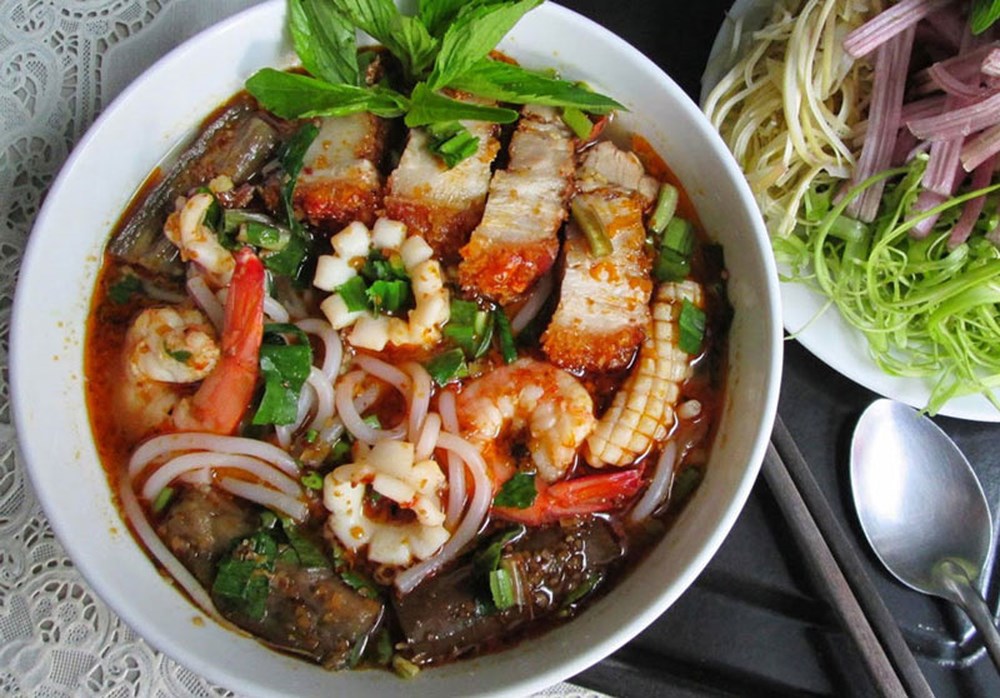
Bun Mam
Bun Rieu Cua
Bun Rieu Cua is a kind of noodle soup including crab meat, tomato paste, pork, and even snail. It is something that crab lovers should not miss because crab is the highlight of the soup, the key protein component. Besides, people add pork, egg, fried tofu, prawns, pig blood pudding, bean sprouts, and fresh Vietnamese herbs like perilla and cilantro. You can add some shrimp paste for extra savory like local people often do if you do not mind the pungent smell.
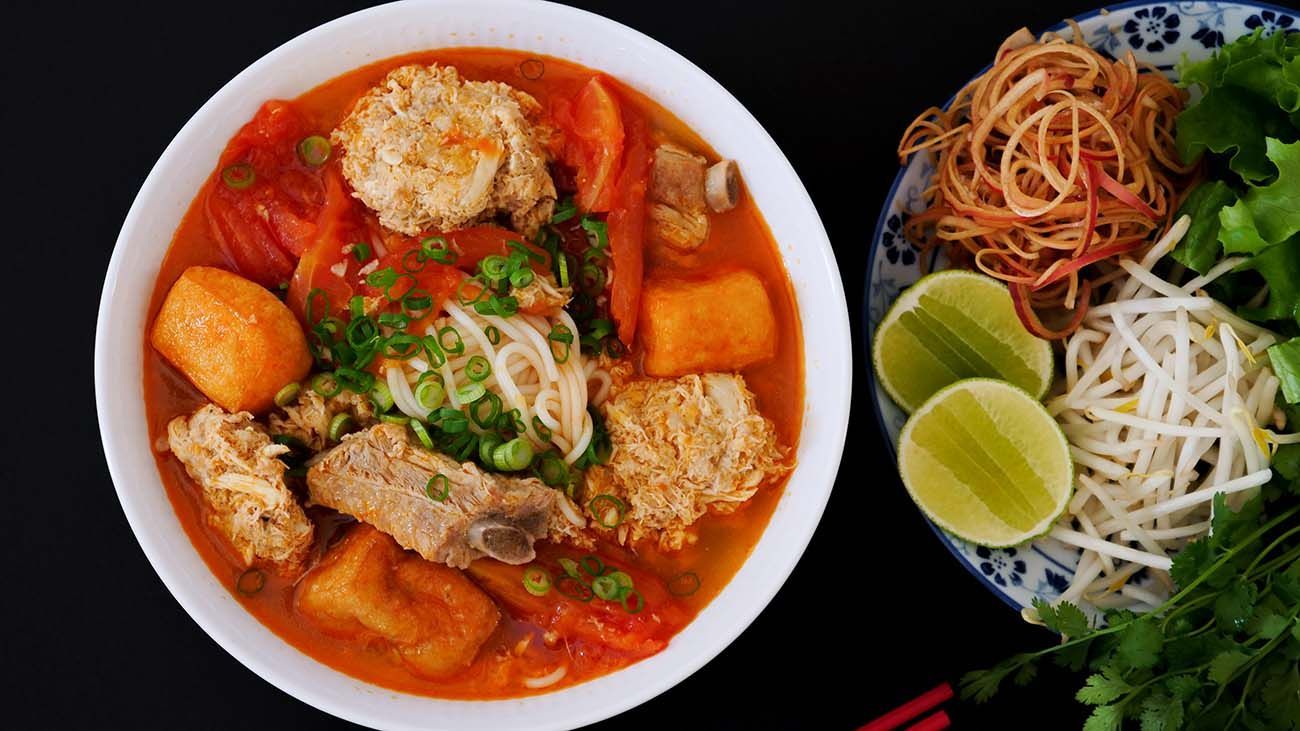
Bun Rieu Cua
Dry noodle dishes
Bun Cha
Bun Cha is a Vietnamese dish of grilled pork and noodle, which is thought to have originated from Hanoi. Bun cha is served with grilled fatty pork over a plate of white rice noodles and herbs with a side dish of dipping sauce. There are two types of meat in Bun Cha: meatballs (made out of lean meat and fat from the pork's shoulder meat) and thick pork slices. The pork must be marinated with spices overnight so that it absorbs all the aromas. This dish became more popular when President Obama and Anthony Bourdain came to eat during their state visit to Vietnam.
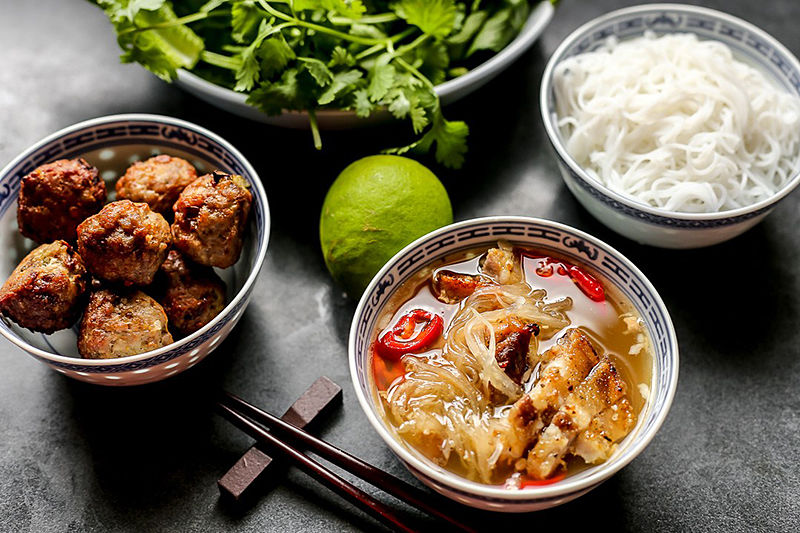
Bun Cha
Bun Dau Mam Tom
Bun Dau Mam Tom (shrimp paste tofu noodles) is simple but very popular in the north of Vietnam. It is vermicelli noodles with fried tofu served with shrimp paste and vegetables. Besides, these noodles are also served with thin boiled pork belly or pig leg slices, boiled pig guts, Vietnamese sausage, Vietnamese head cheese, pork patties, and fried minced pork with green rice flakes. However, shrimp paste has very strong and smelly, you’ll either love it or hate it.
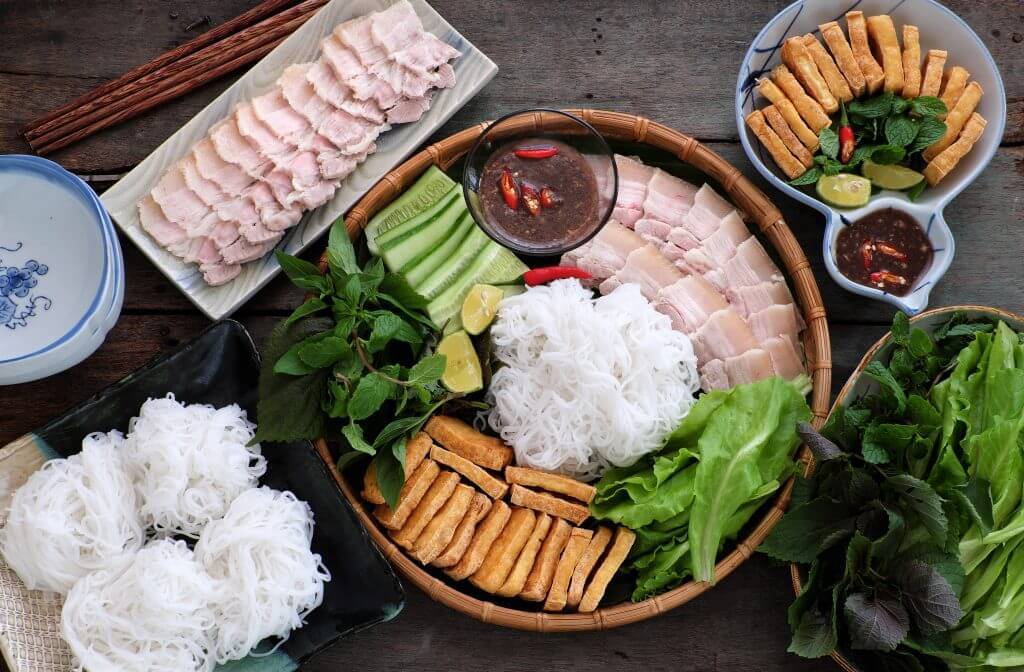
Bun Dau Mam Tom
Bun Bo Nam Bo
Bun Bo Nam Bo (beef noodles in the south) is also known as stirred beef vermicelli. It is simple but elegant. Instead of using sophisticated broth as Pho, this dish uses sauce. Beef used for the dish is well soaked in sugar, fish sauce and pepper, and other seasonings. It is then stirred to keep its heat. The sauce consists of fish sauce, sugar, lemon, chili but the way they combine these elements is the secret recipe of this dish. The freshness of vermicelli and vegetables, the richness of the beef, the slight sourness and sweetness of the sauce, and pea-nutty taste make this dish one of the best choices among noodle dishes.
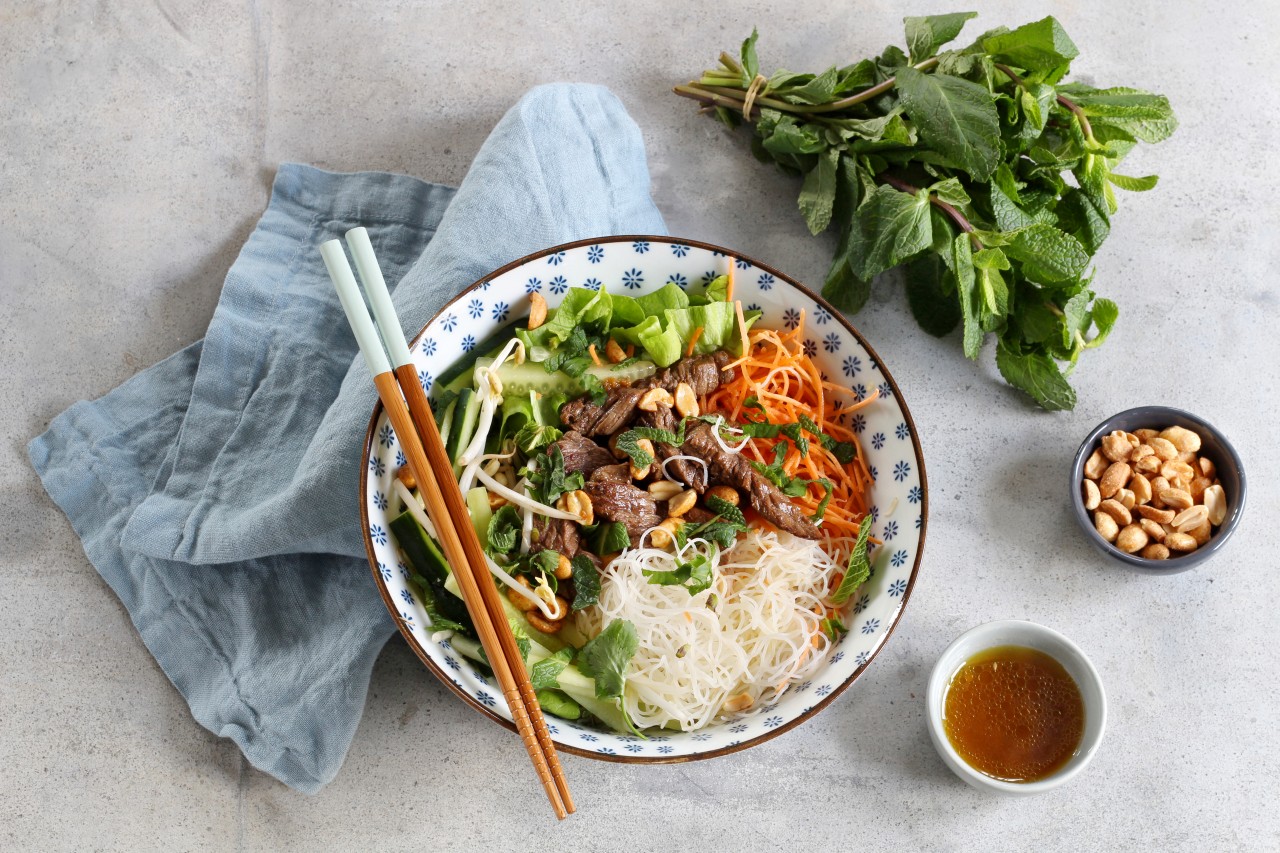
Bun Bo Nam Bo
Noodle rolls
Banh Cuon
Although you can find these rolls throughout the country, they’re preferred by people in the north. People love to eat it for breakfast. Banh Cuon is steamed rice-flour sheets with a variety of ingredients inside. It can be minced pork, onion, wood ear, mushroom, and dry fungus. If you are a vegetarian, you can ask for rolls with only mushrooms in them. Banh Cuon is always served with some sort of sauce such as fish sauce or soy sauce. It’s the perfect meal to start your day with since it’s light and easy to eat.
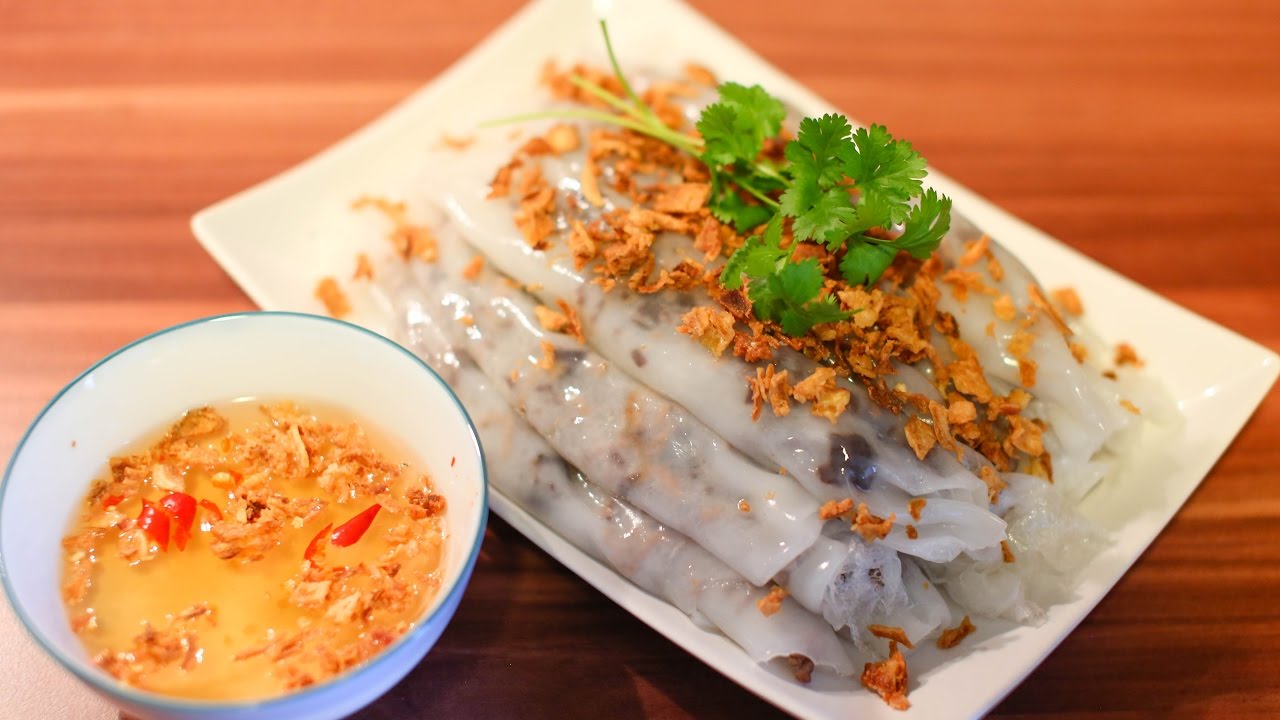
Banh Cuon
Pho Cuon
Pho roll is another dry noodle. It is something similar to noodle soup, however, beef in Pho Cuon is marinated and stir-fried, there is no broth as well. People eat the rolls on their own or dipped in fish sauce with chili, garlic, carrots, radish, vinegar, boiled water, some sugar. You can use Pho roll as an appetizer before the main course or eat together with other dishes.
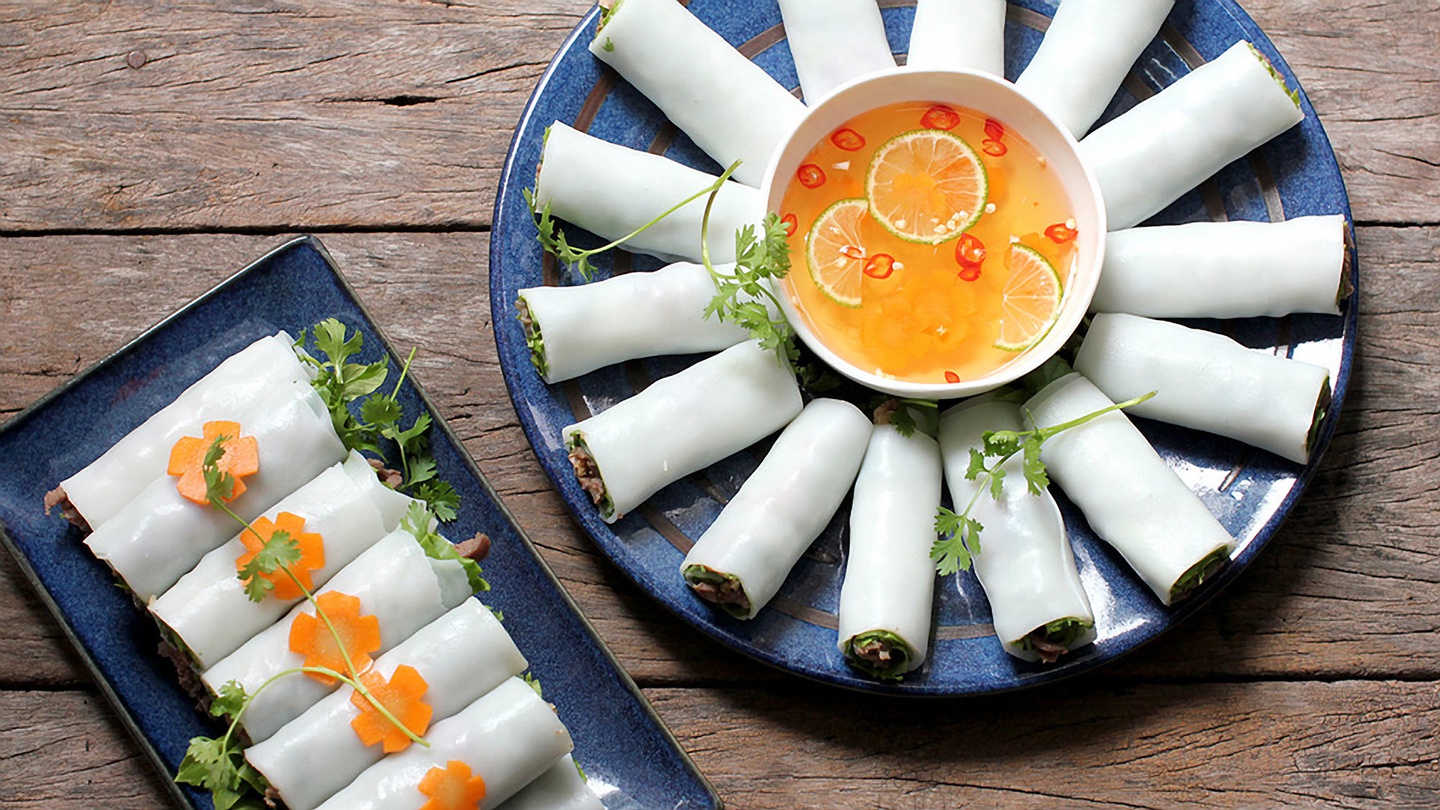
Pho Cuon
Goi Cuon
Goi Cuon or fresh spring roll or “summer rolls” is light and healthy. Fresh spring rolls are served fresh with fillings of cooked meat and fresh vegetables. This dish looks attractive because you can see the red shrimp and green vegetables under the transparent rice paper. Goi Cuon includes steamed shrimp, steamed pork, salad, bun noodles, cucumber slices, lettuce, mint. You can choose mushrooms and tofu spring rolls if you are vegetarian. They’re usually served with garlic soy dipping sauce or peanut sauce.
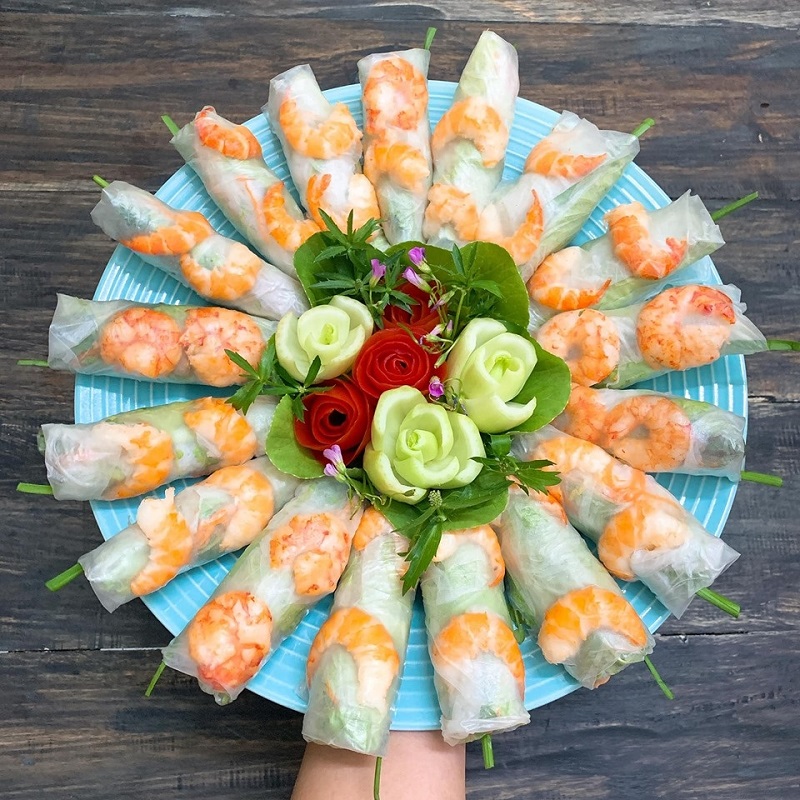
Goi Cuon
Where to get the best Vietnam noodles
Hanoi
Bun Cha Huong Lien - Bun Cha Obama
Bun Cha Huong Lien was found in 1993. This restaurant is extremely famous for its delicious sauce taste and deep-fried crab spring rolls. The cover of the sea-crab spring roll is crispy, the inner meat is savory and sweet-smelling. The sauce taste is moderate, sweet enough. The restaurant is even more famous when Anthony Bourdain and ex-President, Barack Obama came here to eat! People often have to queue for about 10 - 15 minutes under the sun to enjoy Bun Cha Huong Lien at lunchtime.
- Address: 24 Le Van Huu Street, Hai Ba Trung, Ha Noi
- Opening hours: 08:00 am - 10:30 pm
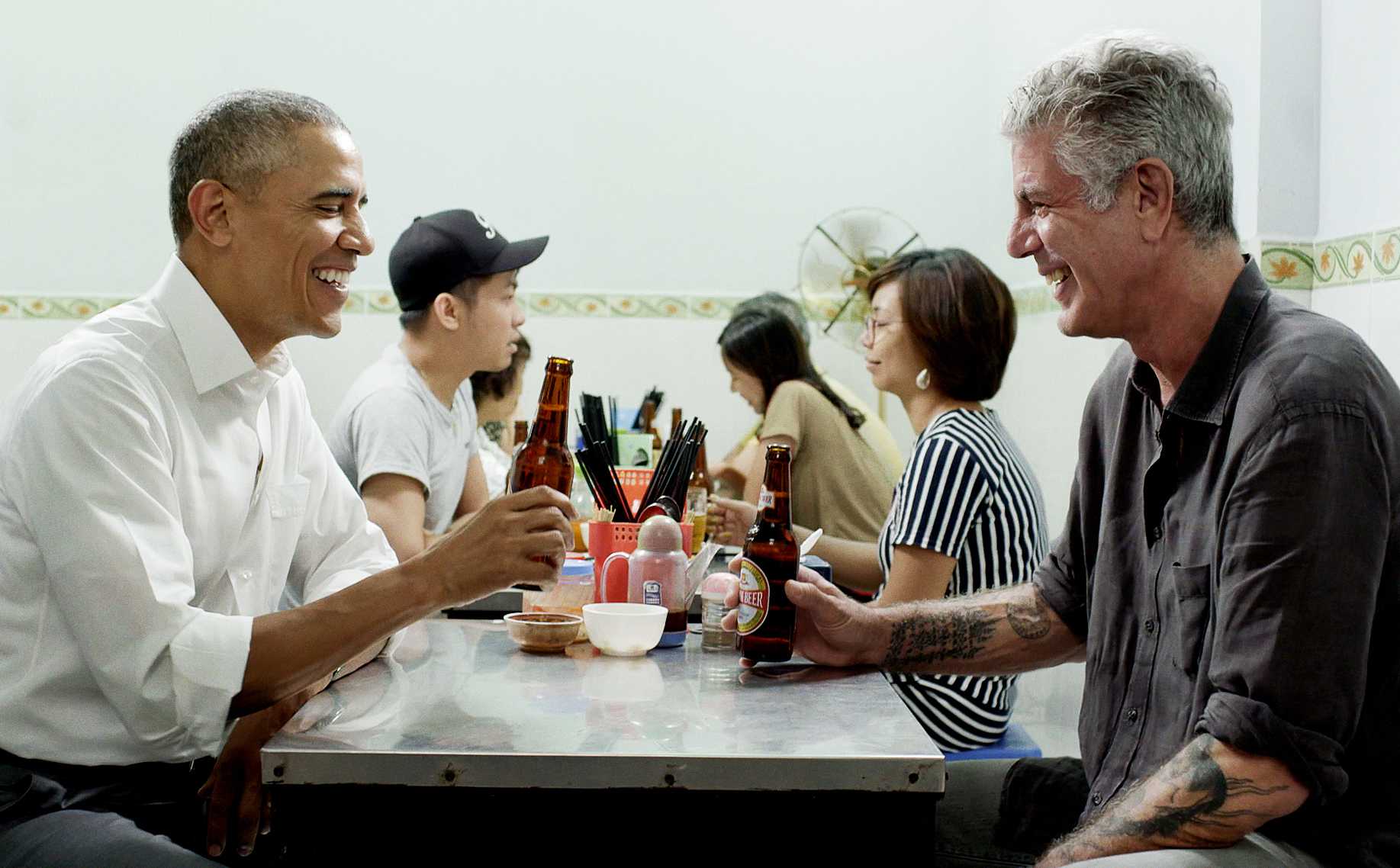
Ex-President, Barack Obama at Bun Cha Lien Huong Restaurant
Pho Bat Dan
It was opened 70 years ago. Pho Ban Dan is not famous for its excellent pho, but also its queueing culture. The beef is fresh, the broth is sweet, the noodles are chewy, soft, fragrant, and freshly flavored of rice. The restaurant is very crowded; you need to wait to order. After ordering, you need to bring the noodle bowl to the table yourself. Despite being crowded, no one complained about the quality of the food here.
- Address: 49 Bat Dan, Hoan Kiem District, Hanoi
- Opening hours: 06:00 am - 10:00 am & 6:00 pm - 10:30 pm
You may also like: Top 10 Vietnamese Pho Restaurants from North to South
Banh Cuon Ba Hanh
Banh Cuon Ba Hanh is one of the leading Banh Cuon in Vietnam. Banh Cuon is rafted by Mrs. Hanh, a famous artist in Thanh Tri Village. The restaurant carefully selects ingredients, mushrooms, sprouts, onion from the farm country to make Banh Cuon. Everything is fresh and nutritious. The restaurant is in the central location and has a good price.
- Address: 26B Tho Xuong Street, Hanoi
- Opening hours: 6:00 am - 3:00 pm & 5:00 pm - 10:00 pm
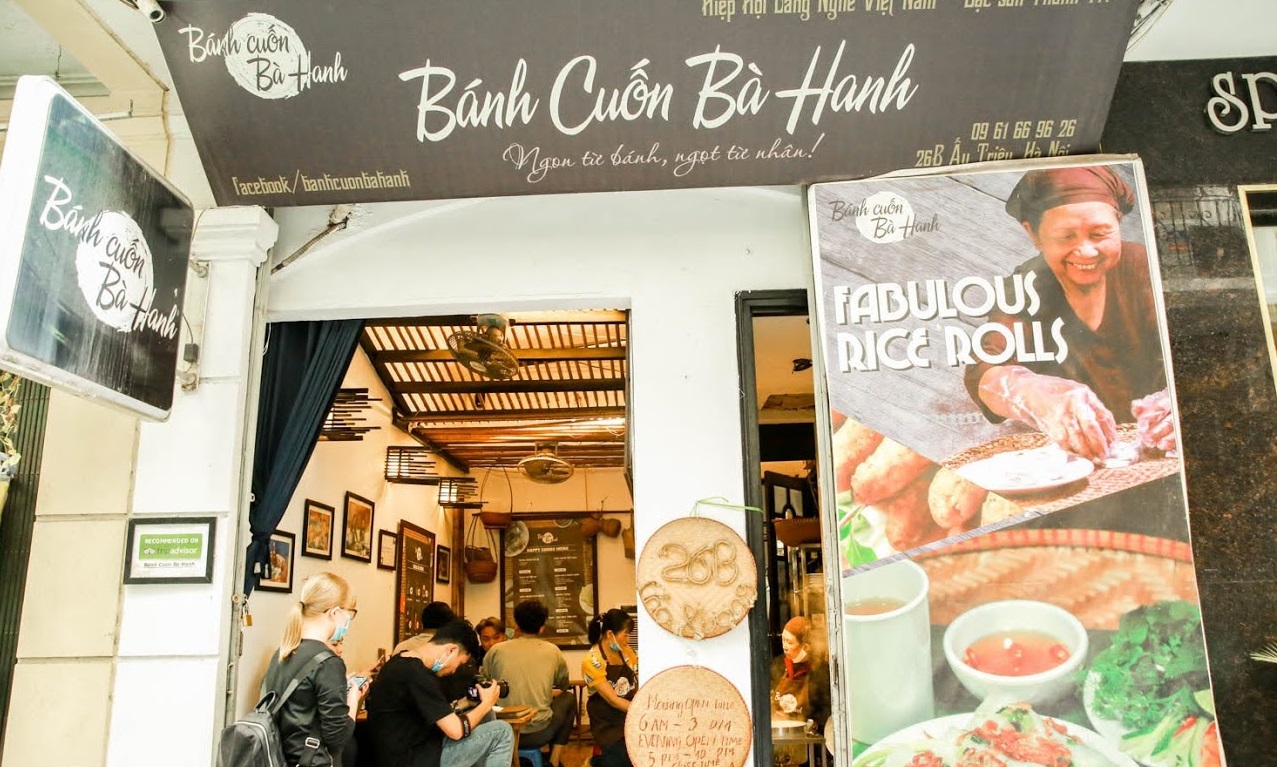
Banh Cuon Ba Hanh
Bun Rieu Cua Hang Bac
The restaurant is in the Old Quarter in Hanoi. You can enjoy eating at this tiny unmarked restaurant where customers gather in a busy, crowded front room, which also spills out onto the street.
- Address: 11 Hang Bac Street, Hanoi
- Operating Hours: 7:00 am - 10:30 pm
Bun Dau Mam Tom Phat Loc
Phat Loc alley is full of bun dau mam toom. Phat Loc alley is always crowded, especially in the afternoon. The restaurant has lovely crunchy fried tofu and bubbly shrimp paste.
- Address: 55 Phat Loc Alley, Hoan Kiem District
- Operating Hours: 8:30 am - 7:00 pm
Bun Bo Nam Bo Bach Phuong
Bun Bo Nam Bo Bach Phuong is famous for the sweet and sour taste of the accompanying fish sauce and the fragrant fried beef pieces. Everything from noodles, meat, and vegetables is perfectly mixed to create delicious and full bowls of Bun Bo Nam Bo.
- Address: 67 Hang Dieu Street, Hoan Kiem District
- Operating Hours: 7:30 am - 10:30 pm
Pho Cuon Ngu Xa
Ngu Xa is a street full of Pho Cuon restaurants. Pho Cuon 31 Ngu Xa serves other kinds of noodles besides Pho Cuon.
- Address: 31 Ngu Xa Street, Ba Dinh District
- Operating Hours: 9:00 am - 11:00 pm
Hoi An
Cao Lau Co Lien
Cao Lau co attracts a large number of local people every afternoon. It opens only a few hours from 2:00 pm, so you need to be there during that time to taste the best Cao Lau in Hoi An. The queue in Cao Lau co Lien can be longer than others.
- Address: 16 Thai Phien Street, Hoi An
- Opening hours: 2:00 pm - 4:00 pm
Mi Quang Ong Hai
Mi Quang Ong Hai Hoi An is a short walk from the center of the Old Town. Noodles in this restaurant are perfectly cooked, with a light turmeric flavor, rich broth, and bright color making for an excellent version of the dish.
- Address: 6A Truong Minh Luong Street, Hoi An
- Opening hours: 11:00 am - 10:00 pm
Bun bo Hue O Cuong Chu Diep
This is one of the best restaurants in Hue where you can have Bun Bo Hue. Having Bun Bo Hue here, you will be able to enjoy a delicious bowl with the sweetness of the bone and the sweet fragrance of each piece of soft spring rolls that are served. The service in the restaurant is also great.
- Address: No 6 Tran Thuc Nhan Street, Hue
- Opening hours: 6:30 am - 11:00 pm
For more details of Best Local Food in Hue - Hue Cuisine
Ho Chi Minh City
Hu tieu Nam Vang Nhan Quan
Hu Tieu Nam Vang Nhan Quan is the place where you can find the best Hu Tieu in Saigon. The soup broth is flavorful "nước lèo" (soup broth) and the filling of the soup bowl is amazing. The dry version of Hu Tieu Nam Vang can be also found here. You dip the noodle into the broth or spoon the broth over the bowl of meats and vegetables.
- Address: 488 Nguyen Thi Minh Khai Street
- Opening hours: 6:00 am - 11:55 pm
Bun Mam 144
This restaurant was opened 20 years ago. It is crowded with customers. The highlight of Bun Mum here is broth and the topping.
- Address: 144 Khanh Hoi Street, District 4
- Opening hours: 9:00 am - 9:00 pm
Wrap&Roll
This is among the best restaurant in Saigon which serves Goi Cuon. The price is reasonable and the roll is fresh.
- Address: 11 - 13 Huynh Thuc Khang Street, District 1
- Opening Hours: 10:00 am - 10:00 pm
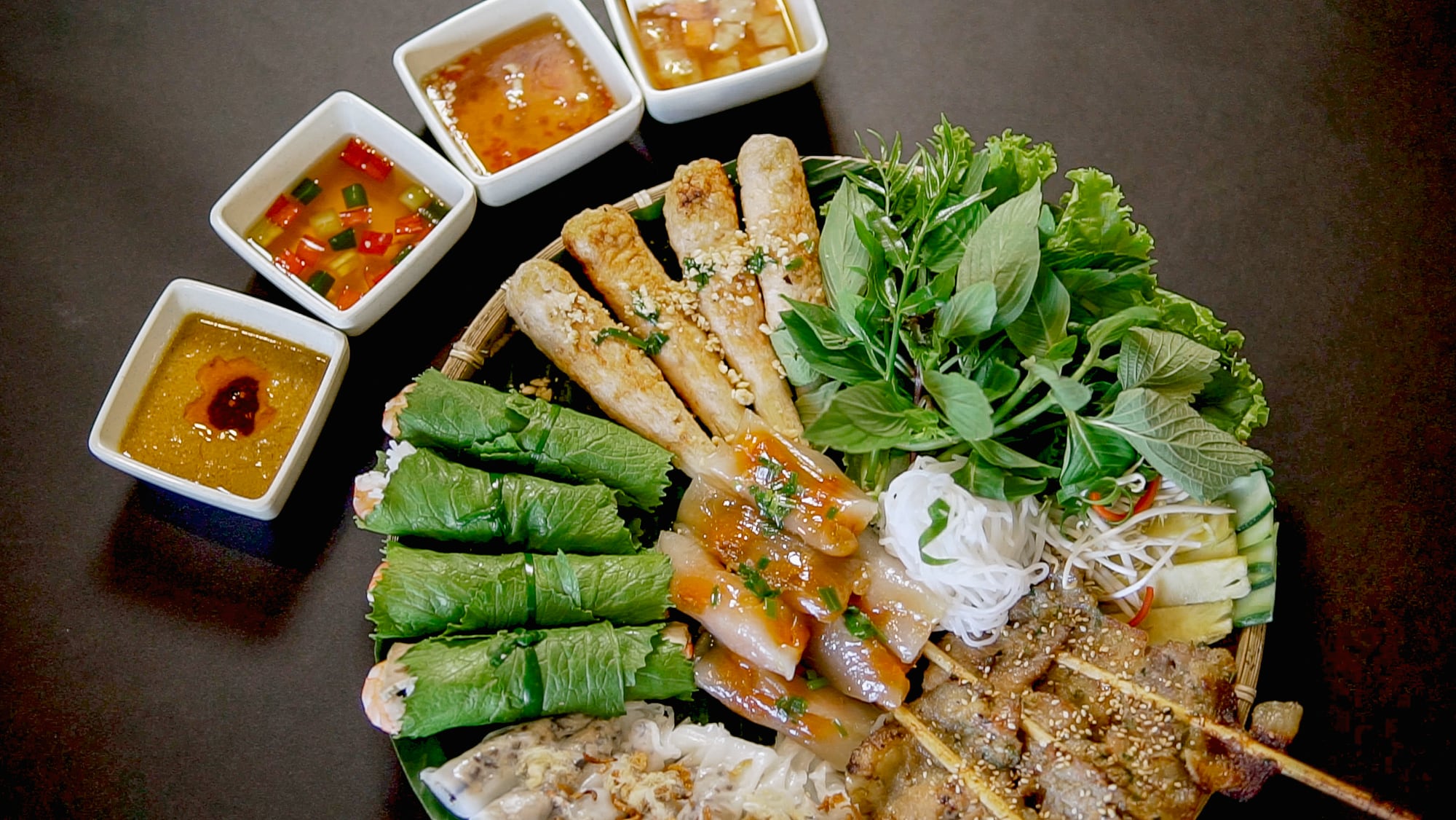
Featured dishes at Wrap&Roll Restaurant
All in all, noodle is an integral part of Vietnamese cuisine. Noodle dishes like Pho noodle soup, Banh Cuon, or bun cha are more and more popular around the world. However, Vietnamese food is more than that. Join our Vietnam food tours and have a taste of the local dishes, you will definitely love it.
Jenny Tran
Image sources: Internet

